

Psychology factors into most of what we do in modern life. Companies use psychology everywhere from human resources to building design. Understanding the human mind is a powerful tool.
Though not always deployed ethically (for more on this, refer to the book I recently coauthored, The Trap: Sex, Social Media and Surveillance Capitalism), please appreciate that experts are constantly employing psychological levers to get what they want.
For those who don’t yet know me, I’ll never teach anything unethical. Why would I teach you how to sell a TON of books if you just feel icky at the end of day? And yes, trust me, I have seen more than my fair share of seriously unethical ways to sell everything.
Yes, even books.
Spoofing


One short-lived grift (THANK GOD) shot to popularity in around 2011-2013. Though I don’t believe anyone gave it a technical name, for me, it was the equivalent of spoofing.
In the cyber community, spoofing uses the psychology of trust. A fraudulent party poses as a site, company, brand that consumers trust (E.g. they create a bank site that looks almost the same as a legit site). In the cyber world, the goal is to gain access to personal data, infect machines or steal money.
An almost identical tactic worked eerily similar in the early world of on-line publishing.
Book Spoofing: Psychology of Brand Loyalty
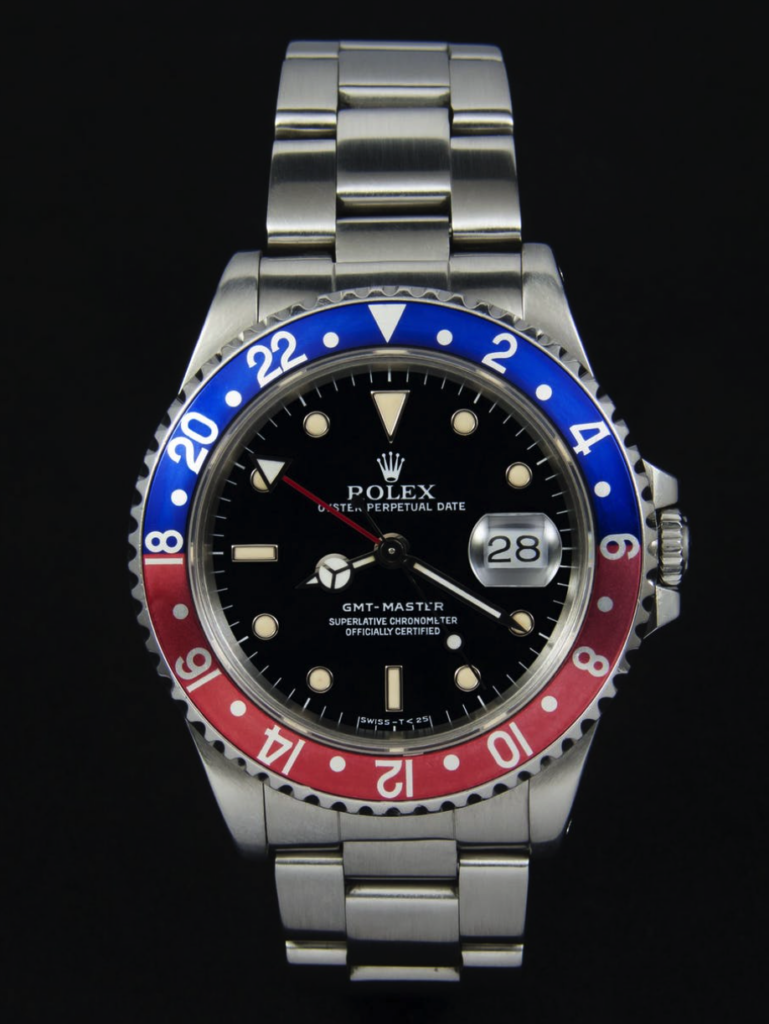

See, in the early days of e-readers, many big name authors either weren’t yet available on ebooks or they were very new to the digital world.
NYC was far from tech savvy, so many of their authors were sitting ducks. Book spoofing (a.k.a. BS) became a popular way to make a quick buck. What was book spoofing?
Unknown, unvetted ‘writers’ just used another author’s hard-earned brand to sell their books.
Readers gravitated by the droves and bought up authors they trusted, not realizing they were actually buying the book equivalent of a Polex watch or Louie Vuiton bag.
Fans were used to seeing these BIG NAME authors turn out a gazillion books and were aware many had insane backlists, thus they had little reason to question the veracity of the titles…until they began reading and realized they’d bought a steaming pile of crap.
Yes, writers con-artists actually did this.
A ‘writer’ would choose a nom de plume that was almost identical to a famous author (E.g. Nora Robert instead of Nora Roberts), then write in the same genre and craft covers to be deceptively similar.
***For the record, I am using Nora Roberts as an example, but YES these writers were foolish enough to spoof brands just as big.)
It doesn’t take much imagination to see the inevitable lawsuits. Despite my quite vigorous protest, plenty of writers played this ‘bait-and-switch’ with readers. They took advantage of Amazon’s emergent SEO system that (at that point) couldn’t discern imposters. Sure, these writers made a TON of money.
Some even tried to lure me over to do the same, boasting of all their riches.
I told them to make sure to save that money for a good attorney and leave me be. I’d earn any best-selling titles myself.
Psychology of Purchases
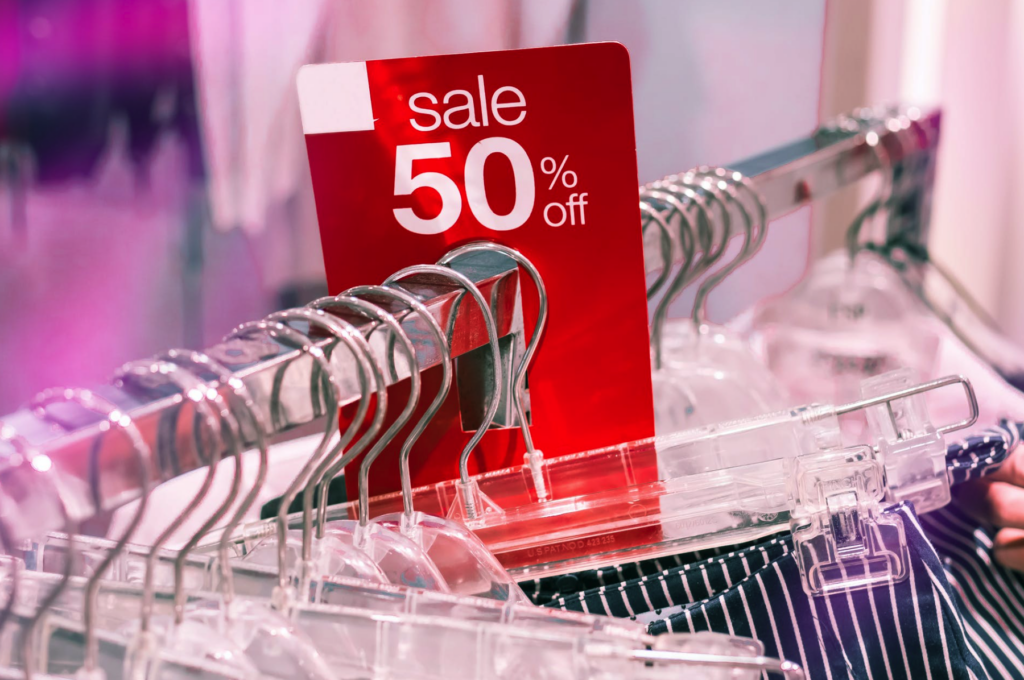

Now that I’ve given an example of how psychology can be used unethically to guide consumer decisions, we’ll move on. Yes, I released my branding book Rise of the Machines: Human Authors in a Digital World in late 2013.
I’ve not written any other branding books because Rise of the Machines is evergreen. Gizmos and platforms and social media sites change all the time. Heck, the entire internet is about to change.
Welcome Web 3.0. Yep, it’s coming.
But you know what never changes? People. Understand people and that is 90% of what you will ever need.
What makes people click, share, read, engage? Why do they buy what they buy? What converts a passive browser to a vested consumer, and a vested consumer into an evangelical super fan?
Search engine optimization, rules for meta data, etc. change constantly. It’s almost a full-time job keeping on top of that.
We can hire the best SEO team, have all the plug-ins and be on all the sites, but if we have the wrong core imperatives? We might as well pile cash on the ground and set it on fire.
Products are NOT One-Size-Fits-All.
Low-Consideration vs. High-Consideration
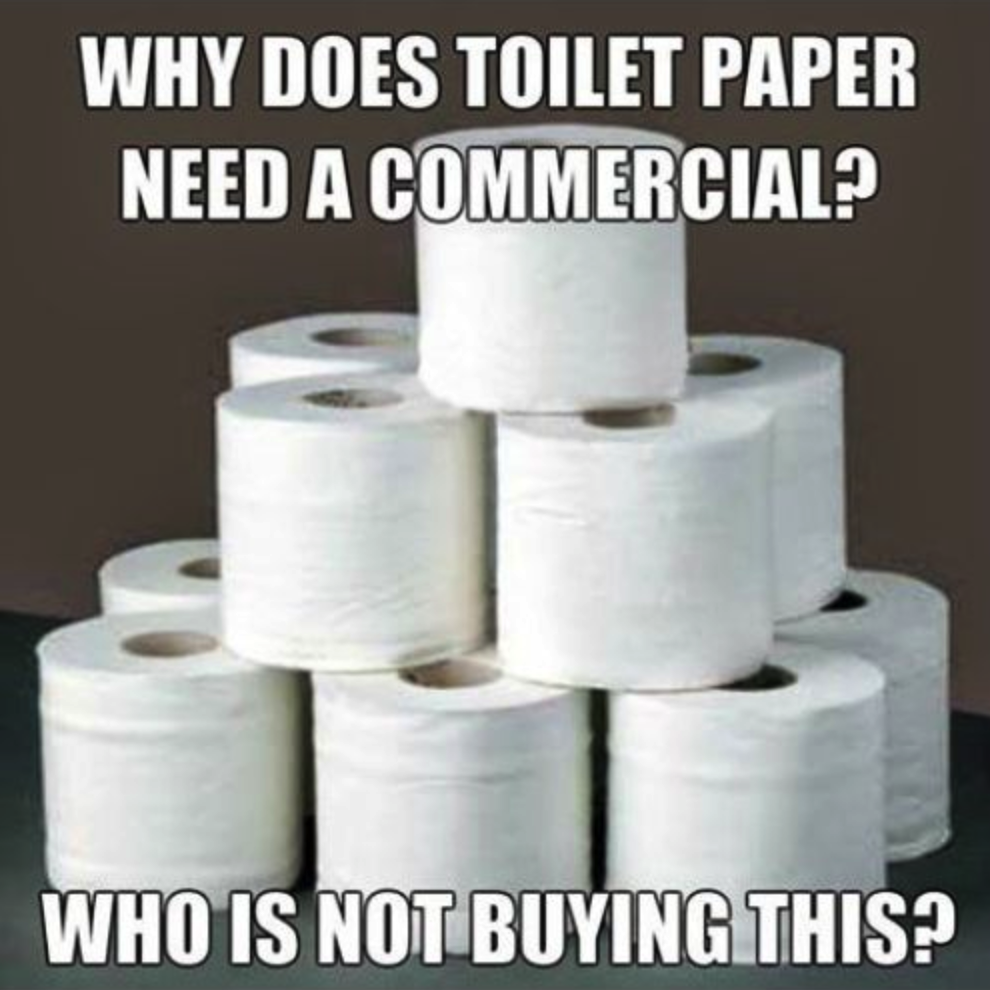

Almost all purchases can be divided neatly into two distinctive categories—low-consideration purchases and high-consideration purchases.
Low-consideration purchases usually aren’t terribly expensive, are common, have a lot of competition, and are something the consumer was going to buy ANYWAY. Haven’t you ever wondered why toilet paper companies spend tens of millions of dollars in marketing?
Who is NOT using toilet paper?
No one is hopping on internet forums to ask experts what is the best toilet paper to buy…and if you are? Um, that’s weird.
Toothpaste. It costs only a few bucks and, if I hate the taste? I toss it. Toothpaste, by and large, is not an emotionally driven experience.
The reason that ads, coupons and FREE work so well with low-consideration purchases is these typically are inexpensive products we probably were a) going to buy anyway or b) were so on the fence that a $2 off coupon or buy-one-get-one-FREE could tip the scales.
High-consideration purchases are the exact opposite.
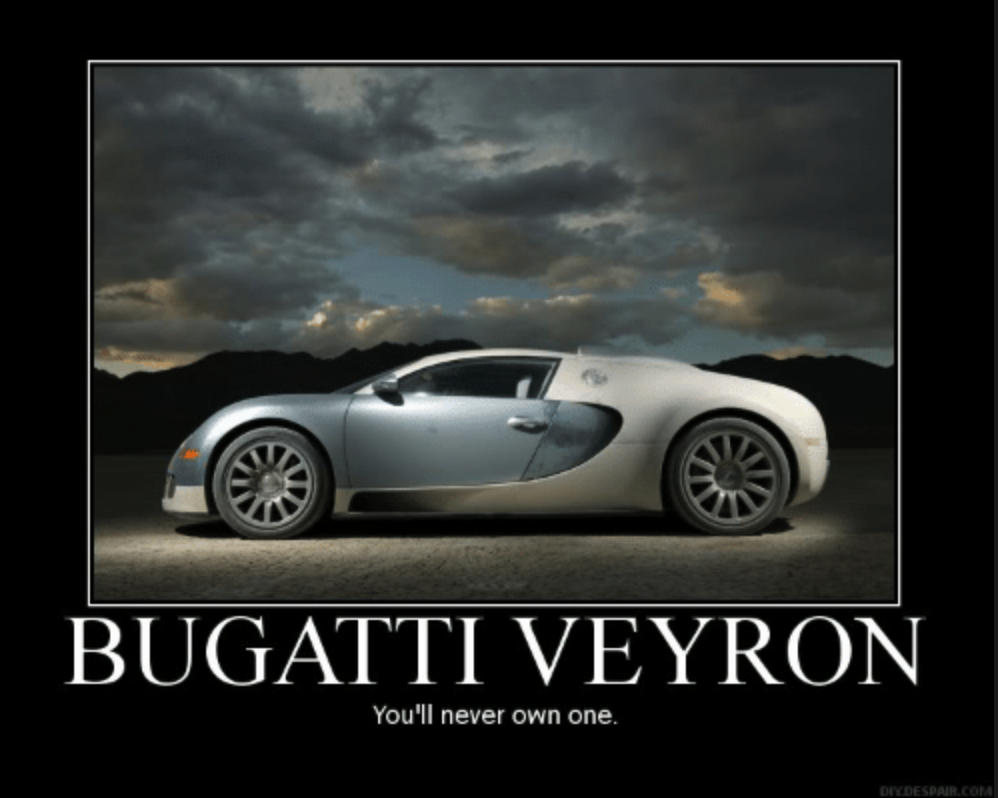

This is when human psychology becomes a game-changer. High-consideration purchases usually cost more, are highly emotional, fueld by peer pressure, and are NOT typically something we’d normally buy.
One might need a car, but no one buys a Bugatti for practical purposes. A $600 generic laptop from Sam’s Wholesale probably works just as well for most users as a $3,800 MacBookPro. A purse from a thrift store can hold my crap just as well as a real Louis Vuitton (probably better since it wouldn’t be a theft magnet)…and yet?
Why are people willing to fork out absurd amounts of money when there are super cheap substitutes that might even work better? Heck just an OIL CHANGE for the Bugatti Veyron is $21,000.
Trust me, if someone is about to drop the equivalent of a year’s salary or more on a car, a boat, a motorcycle, they research. They are on message boards to make sure they’re getting the BEST of the BEST. When it comes to luxury cars, boats, watches and expensive clothing, computers, and accessories? It is largely about EMOTION and is peer pressure powered.
It’s all psychology.
Psychology of Book Sales
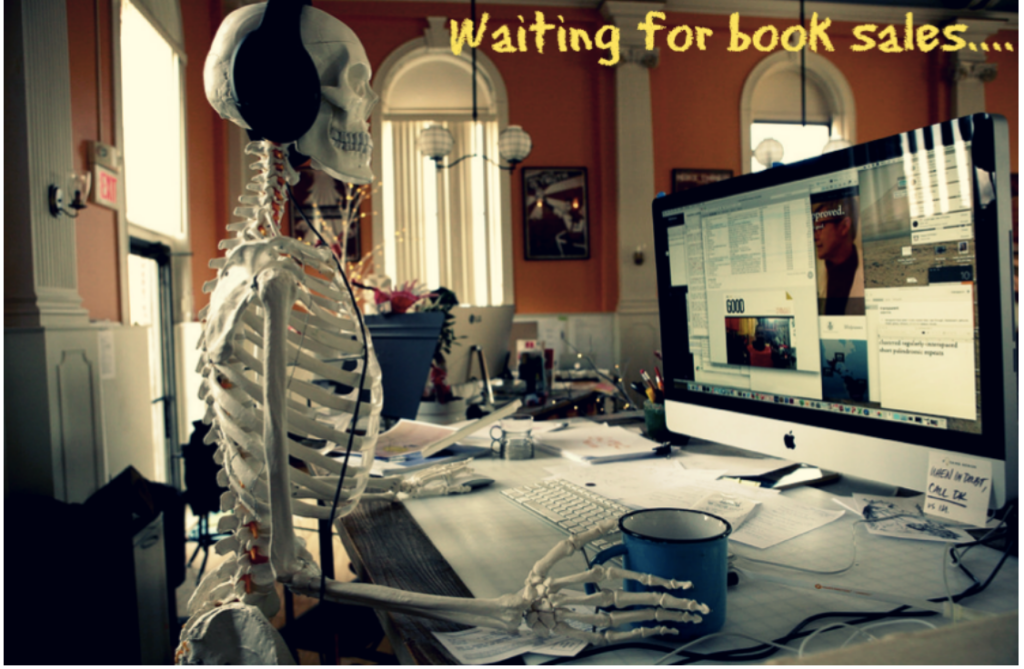

Some of you might be asking what the point of all this is? The point is too many authors fixate on the price of the book and forget the psychology driving the purchase.
At first glance, a book seems to be a low-consideration purchase. I mean, most books cost about the same as a tube of toothpaste. No more than a box of generic teeth-whitening strips. So authors run promotions (coupons) and giveaways and offer FREE books!
*crickets*
So why don’t the tactics that normally boost sales for toilet paper and toothpaste NOT work for books?
Because books, ironically, are a high-consideration purchase. Most people do not like to read *all authors collectively gasp in horror.*
It’s true. If you polled the majority of the population and asked for a list of the top ten things most people love doing in their free time? Reading probably not on the list. In fact, something like 94% of the literate population doesn’t like reading.
Herein lies the rub. We (authors) see the price of our book, but the consumer sees the COST of their TIME. Time is their most valuable resource and no one ever seems to have enough.
Thus, when we go to sell a book, essentially what we are asking is for people to PAY MONEY and give up 12-15 hours of precious and nonrenewable time…to engage in an activity they believe they dislike.
No pressure there, right?
Why Marketing DOES NOT SELL BOOKS
When I say marketing, I mean traditional marketing. As I just mentioned, if we simply look at the MSRP, books appear to be a low-consideration purchase when they are, in fact, a HIGH-CONSIDERATION purchase.
Book sales are driven by brand and buzz. Most of the big brands are there to stay. Robert Ludlum and Tom Clancy are still hitting the NYTBS lists even though both authors passed away years ago. Ludlum passed in 2001 and Clancy in 2013.
Unknown but skilled authors, however, are still keeping these colossal brands alive and thriving. The fans remain happy because a) there is a degree of brand integrity they can trust and b) they still get to enjoy new books from their favorite brand.
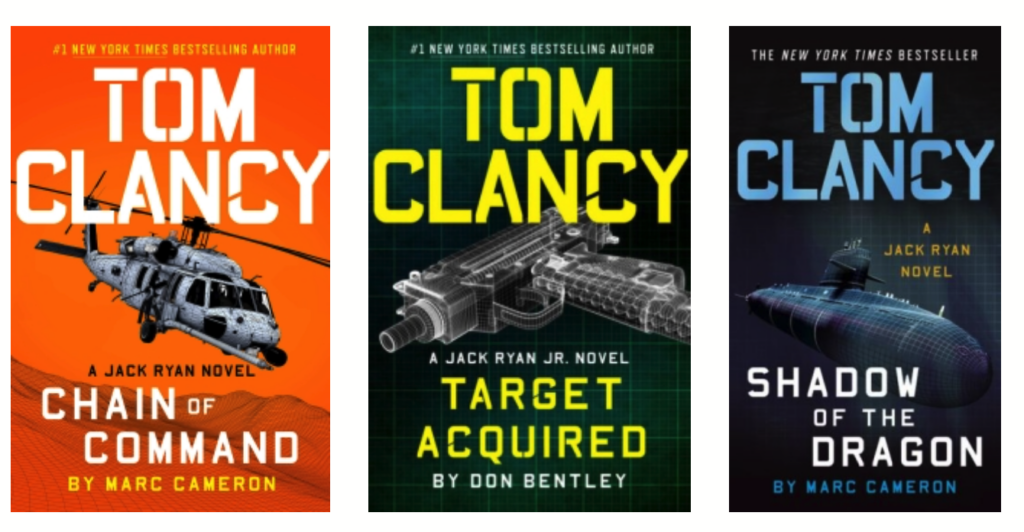

Even people who typically do not read will happily shell out the full price of a Brad Thor, Stephen King, or Sandra Brown when trapped in an airport because they know and trust the names (code for ‘brand’).
FOMO & Psychology of Sales


When regular people (code for ‘readers’) ask me what I do for a living and I tell them I am an author? At least 80-90% of the time the first question they ask me is whether or not I’ve read 50 Shades of Grey.
And I’ve found at least 50 ways of politely saying, “No.”
No shade on E.L. James (and no pun intended) because she created a cultural phenomenon. Whether this book is my cup of tea or not doesn’t matter. Good for her for generating FOMO.
There is a psychological lever often referred to as FOMO (Fear of Missing Out). This is one of many reasons this book became SO BIG. It garnered SO MUCH BUZZ that those who’d not yet read the book felt a sense of peer pressure to see what all the hype was about.
The same can be said about Game of Thrones. Without the HBO series, how many regular people would have bothered with George R.R. Martin’s A Song of Ice and Fire books? How many people read The Hunger Games, Twilight, The Martian, Girl with the Dragon Tattoo, Gone Girl, etc. simply because they’d heard SO MUCH BUZZ they finally felt they were missing out?
I guarantee you there are people who own the entire Harry Potter series in hardback but who are unlikely to read anything else and would not consider themselves ‘readers.’
The Psychology of Expectation
Part of the reason the mega brands have so much power is consistency. People KNOW what to expect.
It’s why people (okay, Americans) vacation in exotic places and STILL go to Chili’s or On the Border for dinner. X, Y, Z brand may not be the BEST quality—McDonald’s—but consumers at least know what they are in for.
This is the same with all brands, even in storytelling. Why is Hallmark such a MASSIVE brand? We’ve seen the memes picking on Hallmark movies.
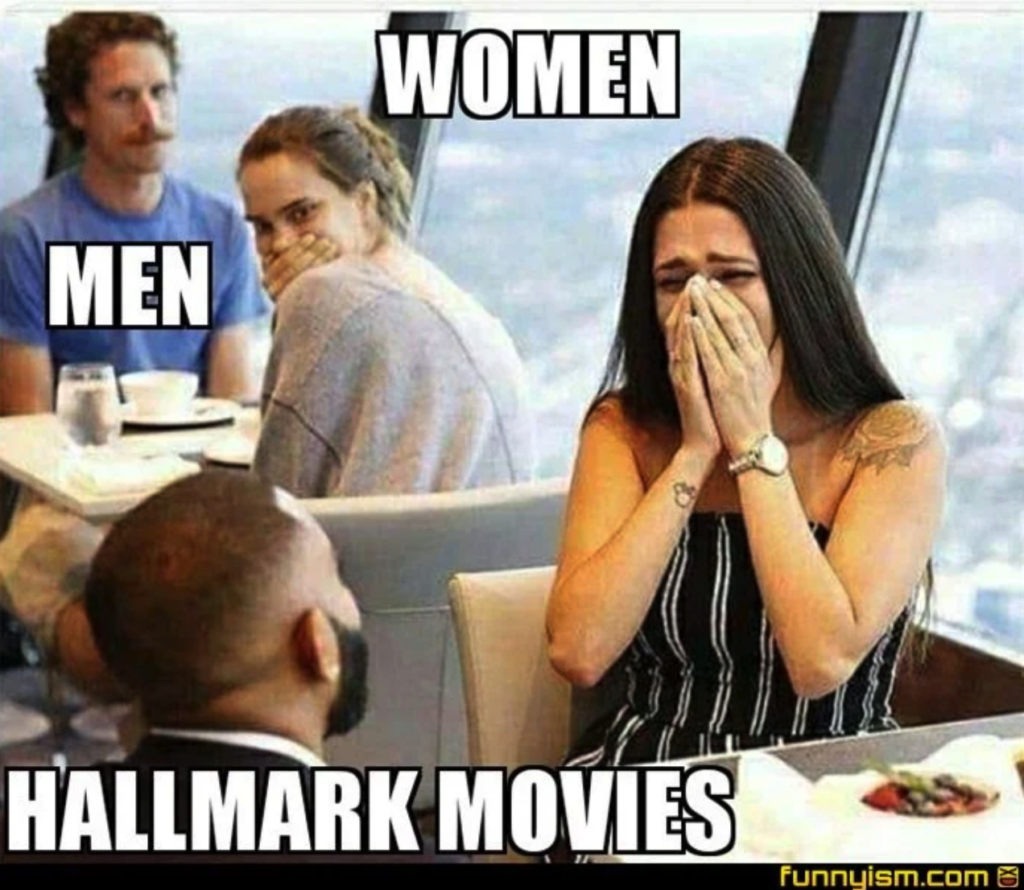

Guess what? Hasn’t stopped them from having their OWN CHANNEL. Hallmark is a force because they KNOW and UNDERSTAND their audience. They provide—in a movie—what most people never will experience in real life but long to. Hallmark doesn’t need to be super complex, thought-provoking, and deep because that is NOT its brand.
People who want to watch movies with 5 subplots and 15 characters are NOT their audience. Why would Hallmark try and meet expectations of those who are not their consumers?


Romance/Erotica accounts for almost $1.5 BILLION in book sales. JUST BOOKS. Why is romance such big business? Again, the psychology of expectations.
Obviously all genres adhere to some sort of a formula, but the strictest of all is romance.
Romantic Interest A meets Romantic Interest B. They initially clash/don’t like each other BUT over time come together as a couple/team to solve greater problem. In the end, there is a Happily-Ever-After or the more modern Happily-For-Now.
Obviously, romance is an incredibly sophisticated genre. The above formula can be executed in any number of ways with any degree of complexity. But, at the end of the story, if Romantic Interest A and Romantic Interest B are not in some way TOGETHER? NOT A ROMANCE.
Whether it is pasta or podcasts or boutiques or blogs, branding is essential. What is a brand?
When a NAME ALONE has the power to drive sales.
From Hallmark to Hello Kitty, Rolex to romance, consumers need to trust what they are buying/devoting their time to.
What is the Takeaway?


For the WHOLE enchilada about consumer psychology, branding and more, pick up a copy of Rise of the Machines. Since this is a long-ish blog post? We can only cover so much.
The key takeaway is we, as authors, must look beyond price and understand why people buy books. It doesn’t matter if we get great reviews in literary publications (sites) because the regular everyday person isn’t going there.
They’re checking out clothes on Instagram or laughing at TikTok videos. FREE books aren’t going to lure them away from their habits.
Sure, there is a time and place to use FREE, but it’s frequently overused/misused and devalues our product more often than not.
When we appreciate that our goal isn’t a race to the bottom of who can give away the most for free or almost free, that is liberating.
Once we know that we don’t need pay to constantly blitz out ads and marketing campaigns like other products, we can work smarter, not harder.
What Are Your Thoughts?
Now that you understand some of the psychology behind why people BUY, does it make sales seem a more manageable? Did you ever wonder WHY manufacturers advertise toilet paper? Does this take some of the pressure off knowing how much we really do control (quality, consistency, quantity, reliability)?
Any thoughts? Additional comments or questions?
Make sure you scroll down and sign up for one of the new classes. Only the BEST for you guys!
I love hearing from you, and I am NOT above BRIBERY!
What do you WIN? For the month of JANUARY, for everyone who leaves a comment, I will put your name in a hat. If you comment and link back to my blog on your blog, you get your name in the hat twice.
What do you win?
The unvarnished truth from yours truly. I will pick a winner once a month and it will be a critique of the first 20 pages of your novel, or your query letter, or your synopsis (5 pages or less).
DECEMBER’S WINNER Rae Longest. Please email your 5,000 word Word doc, Times New Roman, double-spaced, 12 point font to kristen at wana intl dot com. Put CONTEST WINNER in all caps in heading so I see you and CONGRATULATIONS!
Classes
***Remember, ALL classes come with a FREE recording of class
Business Classes
All classes taught by USA Today Best-Selling Author/Top Podcaster Cait Reynolds
The POD PEOPLE Podcasting BUNDLE: 3 Classes 1 Low Price
$199 for ALL THREE CLASSES. Normal FULL PRICE for all three classes is $377 USD or $317 USD even with all the early registration discounts
If, however, you choose to buy individually…
$99 USD (Use Code New20 for $20 OFF if REGISTERED BY JANUARY 14th)
$129 USD (Use Code New20 for $20 OFF if REGISTERED BY JANUARY 14th)
How to Make Money & The Business of Podcasting
$149 USD Use Code New20 for $20 OFF if REGISTERED BY JANUARY 14th)
Craft Classes
ON DEMAND The Edge: How to Write Mystery, Suspense & Thriller (Kristen Lamb)
$65 USD Use Thrill10 for $10 off
***More craft classes coming next post
